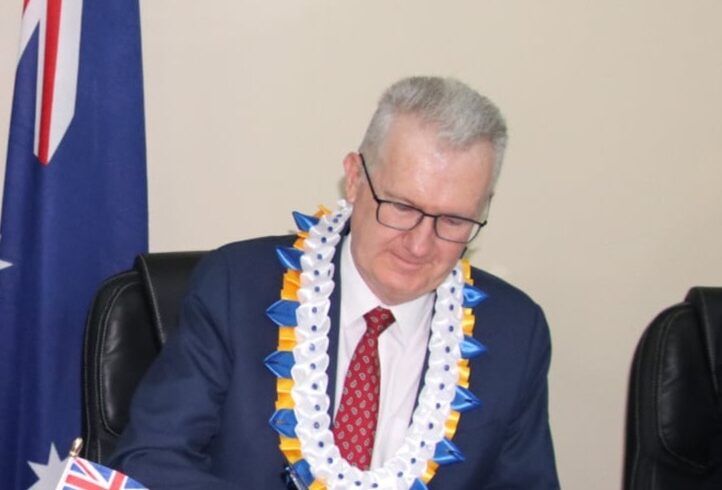
Australia could end up spending around $2.5 billion to resettle up to 354 former detainees on Nauru under, with government officials confirming multimillion-dollar payments would continue for three decades if the agreement is upheld.
The government last week struck a deal with the tiny island nation to take members of the so-called NZYQ cohort, released as a result of a landmark High Court decision, at an initial cost of $408 million and $70 million a year afterwards.
Since then, Labor has refused to release any further information about the terms of the agreement, which was signed by Home Affairs Minister Tony Burke during an unannounced trip to the island on Friday.
But Department of Home Affairs officials appearing before a Senate committee on Thursday night confirmed that the $70 million payments would continue for the 30-year duration of the agreement if significant numbers of the group were successfully resettled.
That makes the total lifetime cost of the deal around $2.5 billion — or more than $7 million per person if all members of the cohort end up in Nauru.
The revelation comes days after Prime Minister Anthony Albanese repeatedly declined to disclose the total cost of the deal, saying only that “there’s complexities and detail here, including the number of people who go”.
Department officials also told the committee that there was no guarantee Nauru would issue visas to the full cohort, many of them being violent offenders, with no minimum requirement included in the memorandum of understanding.
Officials outline funding model
Under the arrangement, the vast majority of the initial payment will go into a trust to be jointly managed by Nauru and Australia, officials told the hearing, while $20 million would be set aside for direct payments to support Nauru’s management of the cohort.
The $20 million would only paid when the first deportee arrived on the island.
Discussions around the financial arrangements were still ongoing, the department’s head of immigration, Clare Sharp, said, but the yearly payment was expected to be “around” $70 million.
The annual payment will flow from year two of the agreement, she said, and would be split between the trust and direct payments to Nauru depending on the number of people from the cohort with visas living on the island.
“If there are six people on Nauru, the majority of that payment goes into trust and sits in the trust, and should the agreement be frustrated and it never grows and it never delivers, the trust could be clawed back,” Ms Sharp said.
For the duration of the agreement, Nauru will be able to access the annual interest generated by the trust, but will not be able to touch the principal. If at any point the agreement was terminated, the trust funds would be returned to Australia.
Ms Sharp said the terms of how many people Nauru would have to take to receive the full financial benefit of the arrangement had not yet been agreed.
“That allocation between trust fund and noting the effect of the claw-back mechanism means it’s pretty speculative to say it will definitely be worth that much money [$2.5 billion] to Nauru at this point in time,” Ms Sharp said.
Independent senator David Pocock said the total amount of money set to go to Nauru — including interest payments on the trust — sounded “totally bonkers, like nuts”.
“This is an extraordinary amount of money,” he said.
Government seeks to bolster deportation powers
The department officials were questioned as part of a snap inquiry into a bill that seeks to bolster the government’s deportation powers by removing the obligation to provide procedural fairness to non-citizens facing removal to a third country.
Under the proposed laws, introduced to parliament on Tuesday, the rules of natural justice — which in practice means the requirement to give people subject to a decision a fair hearing — would not apply in cases where the government has “third country reception arrangements”.
The bill has attracted sharp criticism from human rights lawyers, advocates, the Greens, and crossbenchers, who have warned that it does away with crucial checks and balances.
Members of the NZYQ cohort had previously been held in Australian immigration detention until the High Court ruled in 2023 that it was unlawful to hold people with no reasonable prospects of removal indefinitely.
Many members of the group have a history of violent offending, but have served their sentences.
In February, the government announced an interim agreement with Nauru to resettle three members of the cohort, in what was effectively a test case of new laws passed last year.
All three of the men currently remain in Australia after separate legal challenges stalled their deportation.





